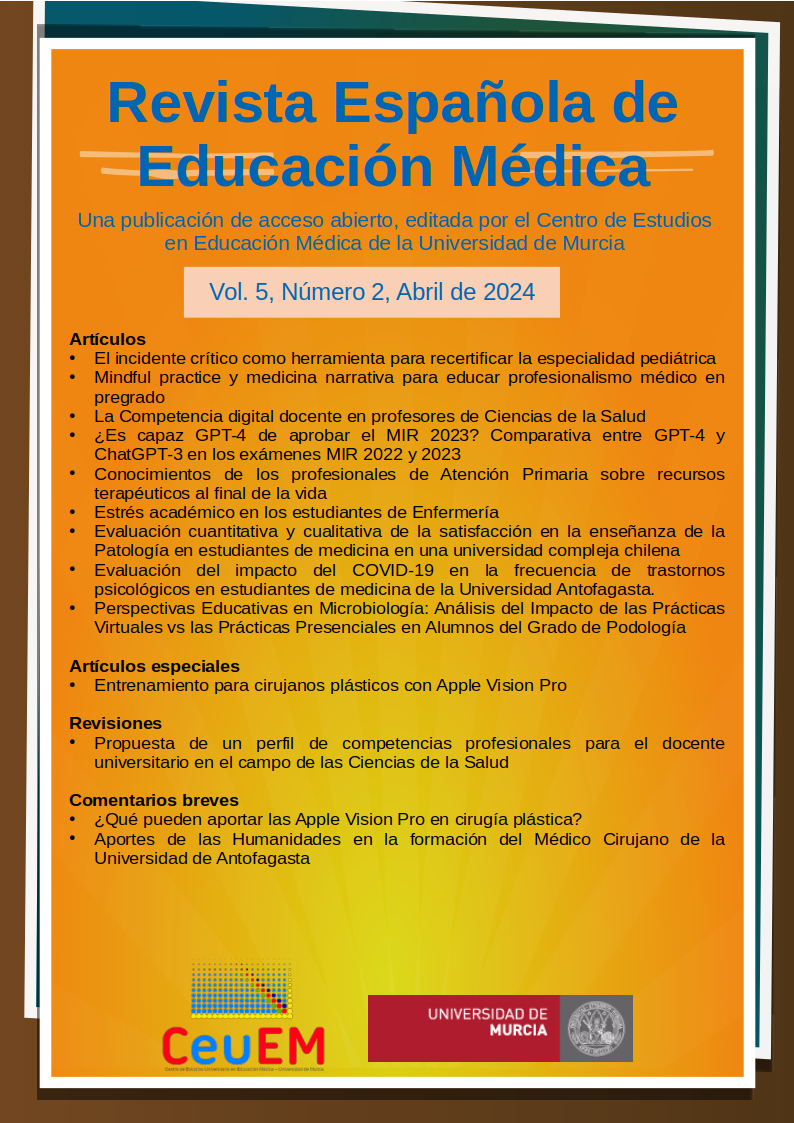Mindful practice and narrative medicine to educate undergraduate medical professionalism.
Supporting Agencies
- No funding was received
Abstract
Medical professionalism and clinical bioethics are sought-after competencies in the medical degree at Valparaíso University and teaching them is a challenging. Narrative medicine as a pedagogical tool addresses issues associated with these two competencies, generating significant learning, while “mindful practice” refers to the systematic use of contemplative methodologies. This article aims to show an innovative educational experience in medical professionalism that contemplates mindful practice or full attention in clinical and narrative medicine. During 2022 a practical-reflective workshop on professionalism was implemented, in the fifth year in the subjects of Adults Clinics, Pediatrics and Women' Health. Sessions included mindfulness practices and exposure to art (movies, poetic reflection, literature, comics, museum immersion), as well as reflective writing. The course was divided into three sections, each participated in 6 sessions of 3 hours. The topics were selected by previous surveys of teachers and students. Each sessions included a survey to evaluate the experience and perception of the students, 98 students participated, and the analysis of reflective texts, stories and poems submitted voluntarily plus feedback survey, indicated high acceptance of the activity, positive assessment of mindfulness experiences applicable to the clinic, learning environment and perception of well-being. Educating professionalism by generating spaces for reflection through a narrative medicine workshop and mindfulness practices is feasible and positively valued by medical students.
exposure to art (movies, poetic reflection, literature, comics, museum immersion), as well as reflective writing. The course was divided into three sections, each participated in 6 sessions of 3 hours. The topics were selected by previous surveys of teachers and students. Each sessions included a survey to evaluate the experience and perception of the students, 98 students participated, and the analysis of reflective texts, stories and poems submitted voluntarily plus feedback survey, indicated high acceptance of the activity, positive assessment of mindfulness experiences applicable to the clinic, learning environment and perception of well-being. Educating professionalism by generating spaces for reflection through a narrative medicine workshop and mindfulness practices is feasible and positively valued by medical students.
Downloads
-
Abstract662
-
pdf (Español (España))497
-
pdf497
References
Puschel K, Repetto P, Bernales M, Barros J, Perez I, Snell L. "In our own words": Defining medical professionalism from a Latin American perspective. Educ Health (Abingdon). 2017;30(1):11-18. doi:10.4103/efh.EfH_4_16
Song X, Jiang N, Li H, Ding N, Wen D. Medical professionalism research characteristics and hotspots: a 10-year bibliometric analysis of publications from 2010 to 2019. Scientometrics. 2021;126(9):8009-8027. doi:10.1007/s11192-021-03993-0
O'Sullivan H, van Mook W, Fewtrell R, Wass V. Integrating professionalism into the curriculum. Med Teach. 2012;34(2):155-157. doi:10.3109/0142159X.2011.595600
Al-Eraky MM. Twelve Tips for teaching medical professionalism at all levels of medical education. Med Teach. 2015;37(11):1018-1025. doi:10.3109/0142159X.2015.1020288
Engel J, Zarconi J, Pethtel L Missimi L. Skills for the Practice of Narrative. En Narrative in health care., 1º ed.; Editorial: Radcliffe Publishing Ltd, United Kingdom, 2008, 167-217.
Charon R, En: The principles and practice of narrative medicine, 1ª ed.; Editorial: Oxford University Press, New Yor, United States of America, 2017, Parte 4, chapter 7, 157-179.
Epstein RM. Mindful practice. JAMA. 1999;282(9):833-839. doi:10.1001/jama.282.9.833
Epstein, RM. (2003). Mindful practice in action (I): Technical competence, evidence-based medicine, and relationship-centered care. Families, Systems, & Health, 21(1), 1–9. https://doi.org/10.1037/h0089494
Epstein R. Attending. Medicine, Mindfulness, and Humanity. New York: Scribner, 2017 (los pies en pág 83)
Charon R. The patient-physician relationship. Narrative medicine: a model for empathy, reflection, profession, and trust. JAMA. 2001;286(15):1897-1902. doi:10.1001/jama.286.15.1897
Charon R, Hermann N, Devlin MJ. Close Reading and Creative Writing in Clinical Education: Teaching Attention, Representation, and Affiliation. Acad Med. 2016;91(3):345-350. doi:10.1097/ACM.0000000000000827
Mukunda N, Moghbeli N, Rizzo A, Niepold S, Bassett B, DeLisser HM. Visual art instruction in medical education: a narrative review. Med Educ Online. 2019;24(1):1558657. doi:10.1080/10872981.2018.1558657
Cerqueira AR, Alves AS, Monteiro-Soares M, Hailey D, Loureiro D, Baptista S. Visual Thinking Strategies in medical education: a systematic review. BMC Med Educ. 2023;23(1):536. Published 2023 Jul 27. doi:10.1186/s12909-023-04470-3
Reilly JM, Ring J, Duke L. Visual thinking strategies: a new role for art in medical education. Fam Med. 2005;37(4):250-252. https://www.stfm.org/familymedicine/vol37issue4/Reilly250
Cerceo E, Vasan N. Creating Alignment: How the Humanities Can Help Heal Physicians and Patients. J Med Educ Curric Dev. 2023;10:23821205231203487. Published 2023 Sep 27. doi:10.1177/23821205231203487
Quote Origin: I Do Not Know What I Think Until I Read What I’m Writing. Disponible en https://quoteinvestigator.medium.com/how-do-i-know-what-i-think-until-i-read-what-i-write-54c95903ab91
Copyright (c) 2024 Servicio de Publicaciones de la Universidad de Murcia

This work is licensed under a Creative Commons Attribution-NonCommercial-NoDerivatives 4.0 International License.
The works published in this magazine are subject to the following terms:
1. The Publications Service of the University of Murcia (the publisher) preserves the economic rights (copyright) of the published works and favors and allows them to be reused under the use license indicated in point 2.
2. The works are published under a Creative Commons Attribution-NonCommercial-NoDerivative 4.0 license.
3. Self-archiving conditions. Authors are allowed and encouraged to disseminate electronically the pre-print versions (version before being evaluated and sent to the journal) and / or post-print (version evaluated and accepted for publication) of their works before publication , since it favors its circulation and earlier diffusion and with it a possible increase in its citation and reach among the academic community.



















